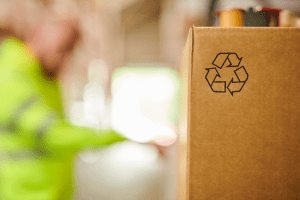Environmental Impacts of Carbon Footprint
Nowadays a company’s carbon footprint is a crucial factor to lots of stakeholders (Customers, Councils, Governments, Employees etc) the environmental impacts of a company is increasingly important when trying to tackle climate change. In 1994, the first secure online retail transaction was made. In the same year, Amazon was founded, the following year eBay was launched and Nationwide Courier Service beginning to operate in March 2013.
The way in which people shopped began to change rapidly, and this meant that retailers had to change too. To keep up with demand, the parcel delivery and courier sector also needed to change. It needed to expand, become more efficient and to innovate.
How was this achieved, and what is the sector now doing to reduce the carbon footprint of an industry that relies so heavily on fleets of vehicles to transport parcels?
How can Courier Companies can reduce their Carbon Footprint?
Let us look at some ways courier companies such as Nationwide Courier Service are doing to reduce their Carbon Footprint…
One being GPS with the ability to find the best routes to use to avoid congestion and accidents that would slow them down and not getting lost has revolutionized the way couriers run day-to-day. In addition to GPS, the digitizing of delivery addresses, tracking and other logistical information has ensured that parcel delivery companies can meet the forever growing expectations of their customers. Electric vehicles have started to appear on our roads and motorways may prove to be an extremely effective way for the courier sector to reduce its carbon footprint drastically.
 Increasingly electric vans are being seen on the road every day especially with the drastic changes in fuel prices, this means that the van is running solely off electricity without the need of petrol or diesel. Courier services are often perceived as businesses with high carbon emission, but this is not always the case. Energy-efficient distribution can play an especially key role in making the parcel delivery and courier sector more environmentally friendly. Also, the growth in hybrid vehicles so the combination of fuel and electric to reduce the vehicles environmental impact.
Increasingly electric vans are being seen on the road every day especially with the drastic changes in fuel prices, this means that the van is running solely off electricity without the need of petrol or diesel. Courier services are often perceived as businesses with high carbon emission, but this is not always the case. Energy-efficient distribution can play an especially key role in making the parcel delivery and courier sector more environmentally friendly. Also, the growth in hybrid vehicles so the combination of fuel and electric to reduce the vehicles environmental impact.
One way to work toward reducing carbon fuel emissions is by using alternative fuel sources. For example, Biodiesel is a biodegradable fuel alternative made from waste cooking oils, vegetable oils or animal fats. Compared to conventional diesel fuel, which is refined from crude oil, biodiesel produces less air pollution.
What is Nationwide Courier Service doing to reduce it’s carbon footprint?
Nationwide Courier Services are proud to be members of the Investors in the Environment (IIE) we are committed to protecting the environment. We are currently working toward achieving our Green award and offer our customers the option of a carbon-neutral delivery helping them to achieve their sustainability target.
Greener alternatives are now also being used. Some companies are making significant investments to reduce their carbon footprint. Companies like Yodel, DPD, Hermes deliver around millions of parcels each year, and in its peak period, some even deliver around a million a day. They have invested in technology to calculate the most efficient routes and evaluate their drivers’ driving style to further reduce our carbon footprint. Route optimization is an important first step on the road towards creating greener delivery operations.
The less mileage your drivers consume on the road, the lower your contribution to greenhouse gas emissions. One way to cut down on your drivers’ travel times is to optimize their delivery routes. Implementing route optimization software can help you find the shortest and most cost-efficient routes to handle deliveries.
 Courier companies such as Nationwide Courier Service is using and advising customers to use recyclable packaging or already recycled packaging. E-commerce was already booming before the pandemic, and its growth has only accelerated over the last year and a half.
Courier companies such as Nationwide Courier Service is using and advising customers to use recyclable packaging or already recycled packaging. E-commerce was already booming before the pandemic, and its growth has only accelerated over the last year and a half.
This growth has further illuminated the environmental challenges of same day delivery. companies should begin implementing sustainable packaging. To that end, many organizations have reduced the size of their boxes, bags and envelopes, which consequently reduces their usage of plastic protective stuffing. To reduce waste even further, some companies are using packaging made from recycled materials and are even completely doing away with secondary packaging for items that already come in boxes.
Reducing the carbon footprint of delivery is one of the most crucial and pressing environmental challenges businesses face today. As customer demand for environmentally friendly operations surges, companies should take the initiative to explore even more creative ways to make their deliveries eco-friendly. Survey data across 2,512 delivery businesses showed that split between small vehicles / vans (81.5%) – assumed to use petrol – large trucks (16.8%) – assumed to use diesel – and hybrid vehicles (16.8%).

